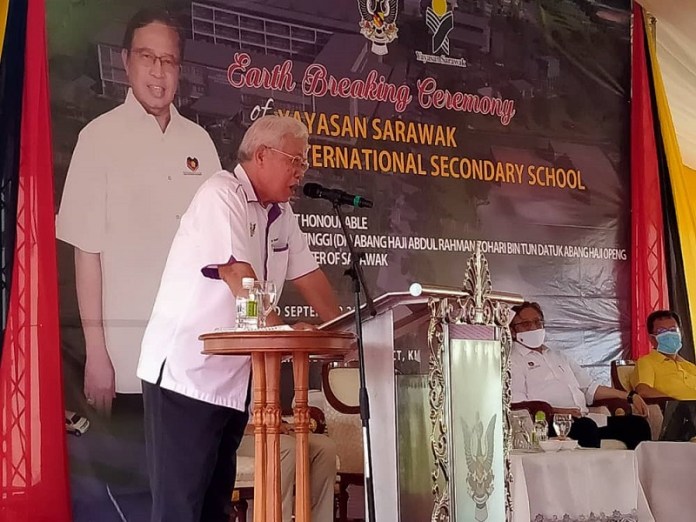
By Karen Bong
KUCHING, Sept 22: Children with high potential from low-income families, especially from rural areas of Sarawak, will be identified to study for free in the five state-owned private international secondary schools with the first facility at Mile 12, Jalan Kuching-Serian here expected to be completed by end of 2022.
Minister of Education, Science and Technological Research Datuk Seri Michael Manyin Jawong emphasised that this was so that excellent students from low-income families will have equal opportunity to quality international education.
He acknowledged that high tuition fees was a major factor preventing parents with limited income from sending their children to international schools which offered a more balanced and well-rounded education to prepare students for the future.
“The serious consequence of this will be a situation where most of the good jobs in industry and commerce as well as the public sector will be taken up by former students of international schools that are mostly from well to do families.
“This will further widen the gap between the urban rich and the rural poor,” he highlighted at the earth-breaking ceremony of Yayasan Sarawak Private International Secondary School officiated by Chief Minister Datuk Patinggi Abang Johari Tun Openg at the site here today.
Exposing underprivileged but brilliant students with quality holistic education, Manyin added, was fundamental to develop them into well balanced, responsible, disciplined and capable leaders.
He said this was evident as the demand for education that used English as the medium of instruction and followed an international curriculum has grown substantially over the last few years.
According to the latest Malaysian International School Market Intelligence Report by ISC Research, he shared that the enrolment in private international schools has grown by 61.2 per cent from 60,400 in July 2013 to 97,300 in July 2019.
“As at January 2020, there were 280 English medium international schools with a total enrolment of 100,060 students at both primary and secondary levels.
“Although Sarawak is slightly behind in this, there are already six private international schools operating here while many Sarawakian parents are also sending their children to private schools in Peninsular Malaysia, Singapore, and even Hong Kong,” he added.
Hence, Manyin pressed that the state government initiated the setting up of its own private international schools was a strategic long term initiative to ensure that Sarawak’s future captains of industry and commerce as well as social, political and civil leaders will not only come from the urban elite, but also from those who have poor and rural background.
“This will not only help to reduce the gap between rural and urban Sarawakians but also create a more inclusive and equitable society,” he said on producing a steady pool of well-educated Sarawakians with the right personality and leadership capabilities to spearhead Sarawak’s continuous development.
On student selection, Manyin explained that there will be a quota for students from well to do families in which they will have to pay the full fees, while students from M40 families will receive partial subsidy while students from B40 families will be given full subsidy.
“Student selection will be inclusive meaning that all students from all races, strata, and origin can enter as long as they are Sarawakians and they meet the selection criteria,” he said.
Meanwhile, MESTR is the proponent of the private international secondary school project and the implementing agency will be Yayasan Sarawak and the schools will be operated by one of its subsidiary companies, Sanjung Services Sdn Bhd.
When fully developed, the schools will cater to students from Year 7 to 11 or Form 1 to 5 with each school taking a total enrolment of 500 students with 100 students in each level.
For each level, there will be four classrooms with 25 students in each class so to keep the class size small to enable effective interaction between students and teachers. Three of the classes will be for STEM (Science, Technology, Engineering and Mathematic) stream and one class will be for Arts stream. — DayakDaily








